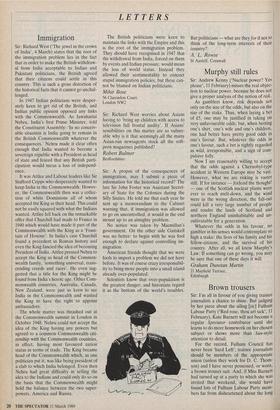LETTERS Immigration
Sir: Richard West (`The jewel in the crown of India', 4 March) states that the root of the immigration problem lies in the fact that in order to make the British withdraw- al from India acceptable to Indian and Pakistani politicians, the British agreed that their citizens could settle in this country. This is such a gross distortion of the historical facts that it cannot go unchal- lenged.
In 1947 Indian politicians were desper- ately keen to get rid of the British, and Indian public opinion opposed any links with the Commonwealth. As Jawaharlal Nehru, India's first Prime Minister, told the Constituent Assembly: 'In no conceiv- able situation is India going to remain in the British Commonwealth whatever the consequences.' Nehru made it clear often enough that India wanted to become a sovereign republic with a President as head of state and feared that any British parti- cipation would mean a loss of independ- ence.
It was Attlee and Labour leaders like Sir Stafford Cripps who desperately wanted to keep India in the Commonwealth. Howev- er, the Commonwealth then was a collec- tion of white Dominions all of whom accepted the King as their head. This could not be easily squared with what the Indians wanted. Attlee fell back on the remarkable offer that Churchill had made to France in 1940 which would have made it part of the Commonwealth with the King as a 'Foun- tain of Honour'. In India's case Churchill found a precedent in Roman history and even the King fancied the idea of becoming President of India. Attlee pressed Nehru to accept the King as head of the Common- wealth family, 'something universal, trans- cending creeds and races'. He even 'sug- gested that a title for the King might be found from India's heroic age. Other Com- monwealth countries, Australia, Canada, New Zealand, were just as keen to see India in the Commonwealth and wanted the King to have the right to appoint ambassadors.
The whole matter was thrashed out at the Commonwealth summit in London in October 1948. Nehru could not accept the idea of the King having any powers but agreed to a common Commonwealth citi- zenship with the Commonwealth countries, in effect, having most favoured nation status in terms of trade. The King became head of the Commonwealth which, as one politician put it, was like being president of a club to which India belonged. Even then Nehru had great difficulty in selling the idea to the Indians and could only do so on the basis that the Commonwealth might hold the balance between the two super- powers, America and Russia. The British politicians were keen to maintain the links with the Empire and this is the root of the immigration problem. They should have recognised in 1947 that the withdrawal from India, forced on them by events and Indian pressure, would mean the loss of world status. Instead they allowed their sentimentality to concoct stupid immigration policies, but these can- not be blamed on Indian politicians.
Mihir Bose
56 Clarendon Court, London NW2


























































 Previous page
Previous page